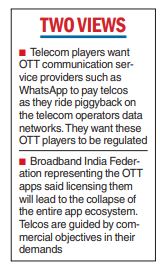Telecom operators and tech giants such as Meta are at loggerheads over regulating OTT communication apps such as Meta’s WhatsApp and Telegram.
In its response to the draft telecom bill, the telecom players under the Cellular Operators Association of India (COAI) has demanded OTT (over-the-top) communications service providers must obtain a licence from the government.
Besides, they must directly compensate the telcos for the data traffic the telcos are driving onto their networks. There should be parity between telcos and OTTs based on the principle “same service, same rules”.
They also want KYC requirements extended to the OTT services in the interests of national security.
OTT communication services include the likes of WhatsApp, Signal, Google Meet, Telegram and other similar apps.
In the future, the same principle of revenue share basis data consumption can be applied to other OTTs (all categories) as well, The director-general of the COAI, S.P. Kochhar, said.
The COAI, in a note outlining the recent submissions on the draft telecom bill, said: “The OTTs providing telecom services similar to telcos such as voice/video calling and messaging within the meaning of telecom Bill... be defined clearly, and the same regulatory and security obligations to be met by them as done by TSPs (telecom service providers) for providing similar services.”

Counter-point
The Broadband India Forum (BIF), which represents tech giants such as Meta, Google, Amazon, Microsoft and TCS, in its submission said bringing OTT communication players under the ambit of the telecommunication service licence implies the government only holds the exclusive privileges to decide on their operation.
“Such a situation is grossly anomalous, highly impractical and will lead to a collapse of the entire app ecosystem and thereby impacting innovation in the economy,” the BIF said. The Internet and Mobile Association of India supported the BIF. The BIF said there were some arguments claiming that OTT communications should be brought under the draft telecom bill. “Such contentions are not correct, both under law and policy. Further such contentions may be driven by commercial objectives,” the BIF said.










